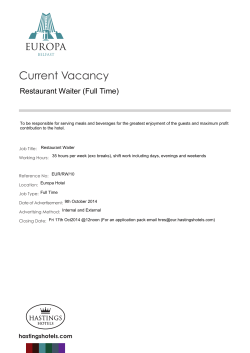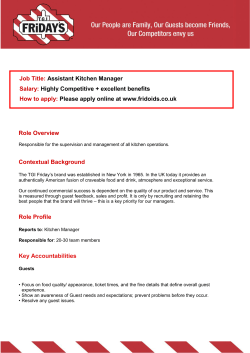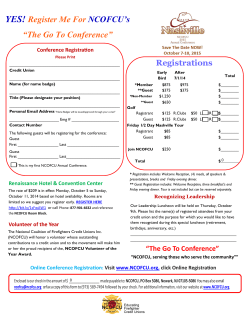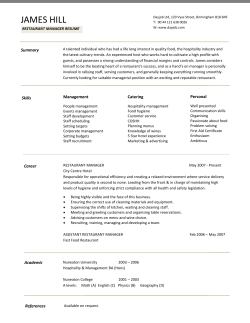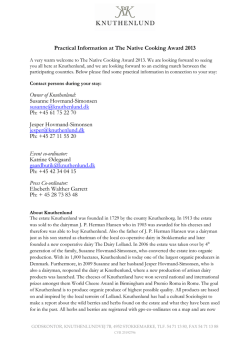
business tips from
INSIGHT INSIGHT 10 business tips from SA’s top chefs BY EUGENE YIGA W hat’s the secret recipe to business success? Finweek talks to some of the country’s top chefs to find out. Though recent findings from Stats SA show that the hospitality industry grew by 5.7% for the year ending July, it’s tough running a restaurant – according to Wendy Alberts, CEO of the Restaurant Association of South Africa, restaurants are under extreme pressure due to increasing electricity and fuel prices, high staff costs as well as exorbitant rental fees, which may be as high as 35% of turnover. Most restaurants are low-margin businesses, profit making up only 5%-10% of turnover, she adds. So, how do you ensure that your business will boom while so many others go bust? As in most professions, talent will only get you so far. Luke DaleRoberts John Shuttleworth Bertus Basson Start small and expand according to demand “We started with a small investment, a small space, and a small staf f co m p l e m e n t , ” s ay s L u ke D a l e Roberts, owner of The Test Kitchen in Woodstock, voted restaurant of the year in 2012 and 2013 and crowned Chef of the Year at the 2011 Eat Out DSt v Fo o d N et wo rk Re s t a u ra nt Awards. “This was more manageable and we were constantly overbooked. We then expanded due to demand.” 42 FINWEEK 13 NOVEMBER 2014 2 3 Be consistent 4 Use the best products available 5 Meet and exceed customer expectations “We nest a poached quail egg in fried potato and aubergine skins. The shell is used as a vessel for the beef jus. We created a caramelised lollipop from the leg of the quail, with the pan friend breast placed atop a potato fondant. The bones were used as garnish and placed on top of braised leeks, with yuzu gel and hints of lemon thyme.” “Consistency is what we strive for every day,” emphasises Shuttleworth. “When a guest returns they expect the same level of food and service they received before. My worst nightmare is that somebody leaves and thinks: ‘They had an off night.’” “Business is always about your customers,” Shuttleworth says. “We strive to give each of our many different types of customers the best possible experience at Rust en Vrede. Most of our business is returning guests or new guests gained through word of mouth, so they arrive with great expectations – and it is our job to meet and exceed these expectations.” David Higgs 6 Invest in your team “Your staff is your most important asset,” DaleRoberts says. “I have great respect for my head chef and believe it’s very important that you respect the work your staff do. I spent years training people and still overstaff my business with students I train.” John Shuttleworth, head chef at Rust en Vrede, a wine estate in Stellenbosch, also highlights the importance of training. “We spend a lot of time training the service staff,” he says. “It doesn’t matter if they are old or new staff members; we are always refreshing different service elements. It’s important that they also have very solid knowledge of the products that we offer.” by David Higgs, head chef at the Saxon Hotel in Johannesburg’s Five Hundred restaurant: “We use the best we can find for our food, wine, cutlery, crockery and glassware,” says Shuttleworth. “So although our prices are in the higher bracket, we want our guests to feel they have received good value for their money.” Here are 10 tips from South Africa’s winning restaurateurs to help you find your own secret sauce: 1 ‘Circle of Life’ dish Most restaurants are low-margin businesses, profit making up only 5%-10% of turnover Manage client relationships “The most important thing in the restaurant business is the relationship with your guest; that welcoming feeling when the staff remembers you and your family and what your preferences are,” says David Higgs, reigning winner of the Eat Out top chef award and head chef at the Saxon Hotel in Johannesburg’s Five Hundred restaurant. “Regular clientele like to see progress, whether it is in your menu or interiors. At some point we all make mistakes as we are all human. [But] if you have a good relationship with your guests, they will forgive you and be back. If not, social media can have a very detrimental effect on your business reputation!” 7 Address customer problems as soon as possible “Deal with customer complaints as soon as possible, on the same day if you can,” advises Higgs. “When left for too long, it becomes tricky to solve. Generally speaking, a problem can be cleared up fairly quickly when the owner or manager of a restaurant speaks to an unhappy guest. People just want to know that they are being heard and that their problem is being dealt with.” 8 Pay attention to the whole guest experience “Never forget that when you work in the hospitality industry you are in the food, drinks and making people happy business,” says Chef Bertus Basson of Overture at Hidden Valley Wines in Stellenbosch. He points out that creating the right ambience – using lighting, music, and so on – creates a great guest experience and keeps patrons coming back for more. Higgs agrees. “Pay attention to the welcome and departure of every guest,” he says. “Giving them acknowledgement, preferably by name, especially at the end of the evening, will make your guests feel welcome and valued.” 9 Get involved in every aspect of the business Dale-Roberts explains that he was involved in every aspect of the business from the very beginning, including mopping the floors and deciding on which products to use to clean the leather couches. “Be involved and know every aspect of your business,” he suggests. “And then you can hand over tasks to be managed by other people.” 10 Don’t become complacent “We have weekly meetings to discuss and implement new ideas, which we believe will improve the guest experience,” Shuttleworth says. Dale-Roberts also believes in constant growth. “You must always look at what you do and renew it, not only for those who buy your product, but also for yourself and your staff,” he says. “It is good to evolve and good for morale to see yourself and your business grow. That’s why we constantly work at improving what we do and how we do it.” ■ editorial@finweek.co.za FINWEEK 13 NOVEMBER 2014 43
© Copyright 2025



